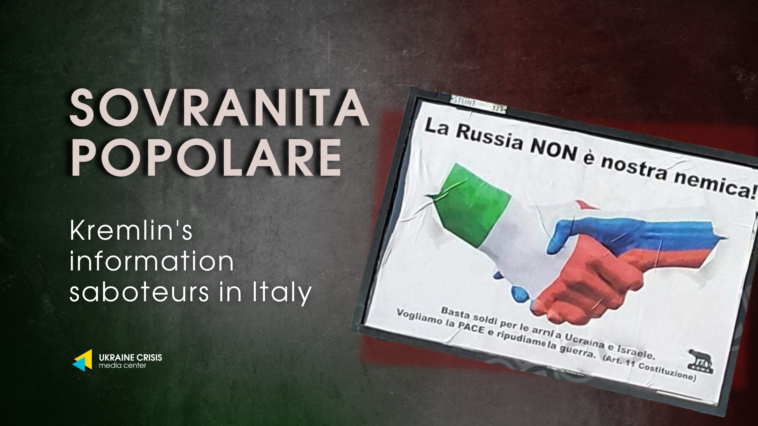By Viktoriia Odusanvo
In September, the world media reported on the emergence of posters in Italy bearing the slogan “Russia is not our enemy,” urging an end to arms supplies to Ukraine and Israel. Similar banners had already begun popping up in northern Italy since early summer. Sovranità Popolare (translated as “People’s Sovereignty”), an Italian organisation, was found to be behind the campaign, with their website later publishing an article outlining the campaign’s objectives.
Sovranita Popolare is an organisation formed as a result of protests against lockdowns during the COVID-19 pandemic. According to the “manifesto” of Sovranita Popolare, “true information can only come from ordinary people, not from the filter of economic groups that control the media.” The organisation’s leader, Davide Gionco, sees an alternative in collectively owned media, where every user can “subscribe to a magazine and become a publisher at the same time.”
Sovranita Popolare has since moved on from the Covid-19 issue and is now publishing articles on a wide range of international relations topics. At the same time, the website has more articles about the Russian-Ukrainian war than other topics.
For example, in the article “Russia is not our enemy!” Stop funding weapons for Ukraine and Israel,” the Sovranita Popolare editorial board explains the motivations behind the pro-Russian campaign and the desire for friendship with Russia.
The authors of the article portray a reality in which Italy “is under the control of secret groups that, by bribing the media, are preparing society for a ’causeless’ war with Russia.” According to the authors of this opus, “…politicians, parties, and the government, supported by the press, have created fear of an enemy that is about to invade Europe.” […] For two years, Italian war supporters have fostered Russophobia, a hatred for the Russian people, culture, and art, while ignoring their own citizens’ desires and well-being.”
Shortly after, Sovranita Popolare published an article titled “Russia is not our enemy,” in response to the events that occurred following the publication of the news about the “poster campaign.” Much of the opus is dedicated to condemning international and Ukrainian media outlets and politicians. Sovranita Popolare denies any ties to Russia, describing its actions as a “expression of public opinion.”
Clearly, these texts are laced with manipulations that pro-Russian agitators frequently employ to justify the need to stop supporting Ukraine.
Let’s take a look at one of the arguments that appears to be a recurring theme in both publications: the government’s “disregard for the opinion” of Italian citizens. In fact, polling data contradicts this claim: in February 2024, Italians ranked Russia 12th among global risks. As of 2023, 39% of Italians regarded Russia as an adversary, while 15% saw it as a competitor. This sociology contradicts the article’s authors’ claim that most Italians have a “strong friendship” with Russians.
The authors of Sovranita Popolare express particular regret for “the ban on concerts by Russian conductors and university studies on cultural figures such as Fyodor Dostoevsky.”
As you are aware, following Russia’s full-scale invasion of Ukraine, EU sanctions were imposed, among other things, on Russian cultural figures who supported the war and Putin’s regime.
As a result, Russian-led tours, concerts, and other events were restricted or banned. An example is the exhibition about the temporarily occupied Mariupol, which Russians attempted to hold in Italy. In January 2024, an exhibition was planned in Modena, Italy, to demonstrate the Russians’ “rapid restoration” of Mariupol.
This exhibition is a cynical propaganda stunt by Russian propagandists, as it promotes the false narrative of the Russians “saving” the city rather than its destruction and the deaths of thousands of Ukrainian civilians. After considering the arguments presented by the Ukrainian community, the event was cancelled.
Despite the fact that the organisation portrays itself as a source of accurate information, the vast majority of publications are biased, ignoring the basic cause-and-effect relationships that have resulted in Russia’s cultural and political isolation in the West.
Monitoring the Sovranita Popolare website reveals the presence of articles written by Russian authors.
“NATO and Ukraine must give guarantees” is an example of an article written by a Russian ‘expert’ on the Sovranita Popolare website
An interview with Vladimir Kozin, a Russian political scientist at the Moscow State Institute of International Relations’ Centre for Military and Political Studies, was chosen as the example text. The “expert” praises Putin as “a leader with a deep vision of the most effective ways to further transform Russia” and discusses the “demilitarised zone” on Ukrainian territory. It is worth noting that on the same day, this article was also published on the website of the Russian propaganda outlet Ukraina.Ru.
Among the texts offered by the organisation in the “books to read” section is “The End of Europe” by Valery Korovin, a Russian politician who is a member of the Izborsk Club (a Russian conservative nationalist organisation) and an advocate of the Russian invasion of Ukraine.
So, in the case of Sovranita Popolare, we’re seeing a typical Russian attempt to recruit marginalised groups of “activists” in European countries. Such organisations’ ideologies are typically a mix of right-wing and left-wing populist slogans, radical interpretations of nonconformism, pacifism, and conspiracy theories.
In the public sphere, such organisations’ activities are accompanied by the widespread use of fakes produced by Russian propaganda. In addition, the Russian media actively promotes the actions they organise in the information space. As a result, organisations such as Sovranita Popolare serve a dual purpose. In the internal Russian “Z-discourse,” they create an image of “protest” sentiment among Europeans against the policy of supporting Ukraine.
Russian-controlled organisations play a minor role in European media, limiting themselves to sporadic information provocations. However, the primary threat, particularly in light of the ongoing global conflict between Russia and the West, is the possibility of using Kremlin proxies to organise sabotage, political provocations, and intelligence activities.

